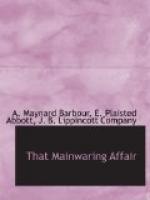“No, sir; my action could not be termed extortion or blackmail within the meaning of the law, though to any one conversant with Mr. Mainwaring’s private correspondence it may have had that appearance. I was, however, merely making an effort to collect what was legally due me. Mr. Mainwaring, before leaving England, had voluntarily bound himself to pay me a certain sum upon the condition that I would not reveal certain transactions of considerably more than questionable character. I kept my part of the contract, but he failed in his. I wrote him, therefore, threatening, unless he fulfilled his share of the agreement, to institute proceedings against him, which would naturally involve a disclosure of his secret. He never paid me in full and the secret is still mine,” he paused, then added slowly, “to keep or to sell, as will pay me best.”
“Was Hugh Mainwaring ever married?” the coroner asked, abruptly.
“I believe he was not generally considered a married man, sir.”
“Was there ever any private marriage?”
Hobson smiled enigmatically. “You already have the word of the lady herself, sir; that should be sufficient. I cannot reveal any of Hugh Mainwaring’s secrets, — unless I am well paid for it!”
Hobson was dismissed without further questions, and the examination being now at an end, the coroner’s jury retired to the room in the rear of the library. Very few left the house, for all felt that little time would be required for the finding of a verdict, and comment and opinion were freely exchanged.
“Well,” said Mr. Sutherland, turning towards the secretary with a smile, “they did not learn one fact from that last witness, for I doubt whether one of the few statements he did make had an iota of truth in it. By the way, Mr. Scott, it’s a very fortunate thing that you’ve got the proofs you have. It would be a risky piece of work to depend on that man’s word for proof; he is as slippery as an eel. With those proofs, however, there is no doubt but that you’ve got a strong case.”
“It will be hard to convince Ralph Mainwaring of that fact.”
“Yes, he looks as though he would hold on to his opinions pretty tenaciously.”
“Not so tenaciously as he would grasp any money coming within his reach!”
At a little distance, Mr. Whitney was engaged in conversation with the Englishmen.
“I never thought he could be in any way connected with it,” he was saying. “In the first place, there was no motive, there could be none; then, again, I believe he is altogether above suspicion. I know that Mr. Mainwaring had the most implicit confidence in him.”
“Well,” said Mr. Thornton, “for my part, I’m heartily glad if there is nothing in it. I always liked the young fellow.”
“That’s just where I don’t agree with you; I don’t like him,” Ralph Mainwaring replied in a surly tone. “He may be all right so far as this matter is concerned; I don’t say yet that he is or isn’t; but I do say that to defame a man’s character after he’s dead, in the manner he has, is simply outrageous, and, you may depend upon it, there’s some personal spite back of it.”




